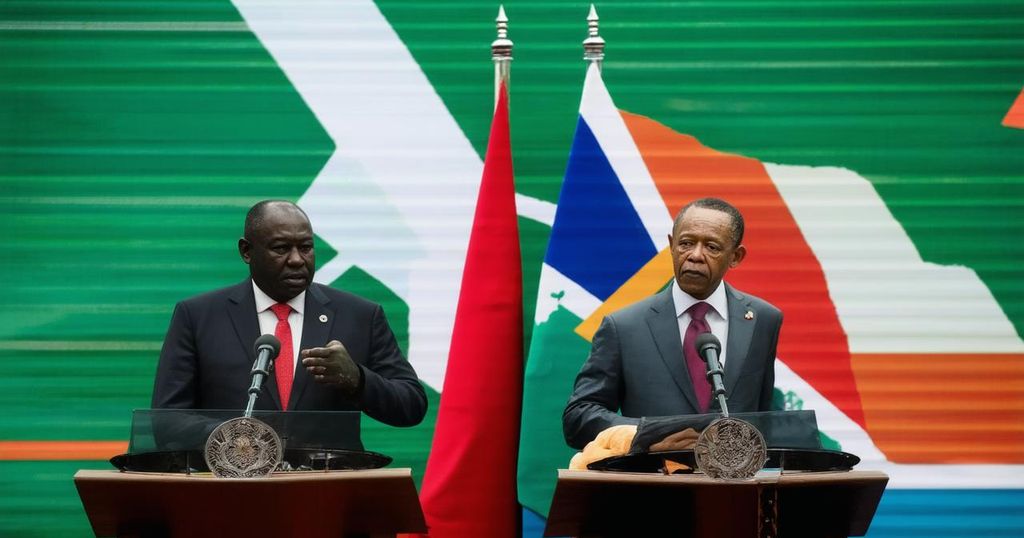The 16th BRICS summit began on October 22, 2023, in Kazan, Russia, where South Africa opposed Morocco’s potential membership, citing fears of diminished influence. The tension between the two countries is rooted in the Western Sahara dispute. While South Africa remains firm against Morocco, China appears open to engaging with the North African nation, complicating the dynamics within BRICS as it expands its membership to include more nations.
The 16th BRICS summit commenced on October 22, 2023, in Kazan, Russia, and South Africa has unequivocally expressed its opposition to Morocco’s potential accession to the BRICS bloc. As leaders from Brazil, Russia, India, China, and South Africa convene to address pressing global issues, the topic of membership expansion remains a focal point of discussion. According to Bloomberg, South African officials have articulated their firm resistance to the inclusion of both Morocco and Nigeria in the BRICS alliance, citing apprehensions regarding the possible dilution of South Africa’s influence within the organization. This sentiment has been echoed by several unnamed officials who have communicated with the media under conditions of confidentiality given the sensitive nature of the discussions. The historical tension between South Africa and Morocco largely stems from the ongoing Western Sahara conflict, which has been a significant point of contention between the two nations. In April 2022, South Africa succeeded in placing the Western Sahara issue on the agenda of the BRICS deputy foreign ministers’ meeting. Tensions escalated in August when South Africa extended an invitation to the leader of the Polisario Front, Brahim Ghali, to partake in a BRICS/Africa meeting in Johannesburg, shortly after Morocco declined South Africa’s invitation, citing strained diplomatic relations. Morocco has purported that South Africa’s invitation was a unilateral action rather than a consensus-driven decision from the BRICS group or the African Union, and it has denied allegations suggesting that it sought membership within BRICS. The BRICS coalition, established in 2009, has witnessed significant expansion recently, welcoming countries such as Iran, the United Arab Emirates, Ethiopia, and Egypt into its fold early in 2024. This enlargement is anticipated to strengthen the bloc’s economic influence, aligning major energy producers with some of the largest consumers among developing nations. While Saudi Arabia has been slated as a new member, the kingdom has yet to finalize its commitment to joining. With Russia serving as the current BRICS chair, the country is eager to utilize this summit as an illustration of its global stature, despite facing persistent international isolation due to the ongoing conflict in Ukraine. Kremlin foreign policy aide, Yuri Ushakov, confirmed that the summit would witness the participation of 36 national delegations and six international organizations, thereby marking the largest assembly of global leaders within Russia since the onset of the Ukraine invasion in February 2022. In contrast to South Africa’s unyielding stance regarding Morocco’s membership, China has adopted a more conciliatory approach. In September, Morocco was invited to take part in the BRICS Forum 2024 focused on partnership for a new industrial revolution in Xiamen, China, where Morocco’s Minister of Industry and Commerce, Ryad Mezzour, represented the kingdom at a gathering intended to foster collaboration and explore partnerships with BRICS nations. This invitation underscores the intricate dynamics within the BRICS alliance, where South Africa strives to assert its regional influence while China appears open to engaging Morocco on economic cooperation. As discussions progress throughout the summit, the dialogue surrounding BRICS’ future and its potential for further expansion is anticipated to dominate the proceedings. With an increasing number of countries, including Malaysia, Thailand, and Turkiye, expressing interest in joining the group, addressing the balance of competing geopolitical interests while fostering economic growth and collaboration remains a paramount challenge for the alliance.
The BRICS group, initially comprising Brazil, Russia, India, China, and South Africa, has become a pivotal economic consortium that engages in numerous global discussions. As it seeks to broaden its membership to include additional nations, the intricacies of member state dynamics, particularly relating to political tensions, become increasingly significant. South Africa’s stance against Morocco’s inclusion reflects deeper historical and diplomatic challenges exacerbated by the Western Sahara conflict, highlighting the delicate balance of power within BRICS as it navigates the interests of diverse member states. The summit in Kazan serves as a critical platform for addressing these complexities, particularly in light of recent expansions that aim to enhance the bloc’s global economic influence.
In conclusion, the steadfast opposition from South Africa regarding Morocco’s potential inclusion in BRICS underscores the complex geopolitical landscape that the bloc must navigate. The historical tensions stemming from the Western Sahara conflict act as a significant barrier as South Africa seeks to uphold its regional influence against the backdrop of an expanding BRICS membership. Meanwhile, China’s willingness to engage Morocco hints at divergent strategies within the bloc, emphasizing the need for careful management of individual member aspirations in pursuit of collective growth and cooperation. The ongoing discussions at the summit will be critical in shaping the future trajectory of BRICS and its expansion strategies as it seeks to balance competing interests among its diverse membership.
Original Source: www.moroccoworldnews.com






